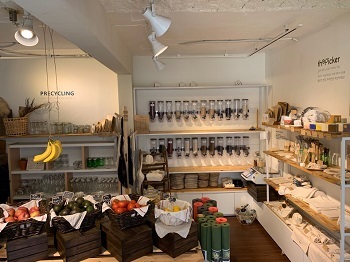By Ahn Chee-young, Yoon Chae-eun, Park Ju-won, Ryu Seo-yeon
Although the severe environmental harm caused by the overuse of plastic is now apparent, plastic goods are still routinely used in daily life. According to UN Environment, each year 500 billion plastic bags are used and 17 million barrels of oil are consumed on plastic production. Of all human-generated waste, 10 percent is plastic. With growing global awareness of the importance of reducing plastic use, Korean society is also doing its part to cut down on plastics through new legislation and various campaigns.
Korean society’s steps to reduce plastic use
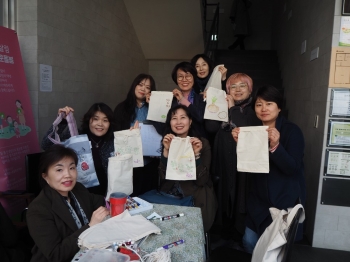
The Ministry of Environment enacted a new law banning the use of disposable plastic cups in stores August 2018 to crackdown on the over-use of plastic. Any stores that provide customers with such cups are liable to pay a fine of up to two million won. Along with the new environmentally friendly policy, many franchises such as Starbucks and Hollys Coffee have pledged to give discounts to customers who bring their own cups instead of using disposable ones.
These policies proved effective. At the “My Tumbler Campaign” event held on May 7 by the ministry and Starbucks Coffee Korea, the ministry announced that the proportion of people using their own cups at Starbucks between May 2018 to May 2019 rose by 178 percent on the previous year.
Since Jan. 1 2019, supermarkets and stores larger than 165 square meters cannot give out nor sell plastic bags. However, small plastic bags placed in the corner where fruit, vegetables and fish are sold may be provided. The government has started to crack down on stores going against the law since April. However, customers can still buy plastic bags at bakeries and traditional markets are wholly exempted from the law.
With the goal of reducing plastic use by 50 percent by 2020, Seoul Metropolitan Government has started a new initiative this year with Seoul Hansalim, a non-profit consumer cooperative.
Seoul Hansalim is one of the many district branches of Hansalim, which strives to provide healthy food to customers while protecting the environment, including by cutting plastic by promoting reusable glass bottles.
“Hansalim has been reusing bottles since the 1990s,” said Hong Seung-hee, chief of Seoul Hansalim Environment Committee. “Back then, the cleaning of these bottles was done manually, but as we gained more union members and recognized the importance of cutting down on plastic, we built a bottle cleaning factory in 2014.”
Hong explained that when Hansalim union members return used bottles after removing any labels and washing them, they are sent to the factory to be cleaned and reused. While around 15 percent of bottles were returned in the first year, the proportion rose to around 30 percent in 2018.
However, Hong mentioned that in order to break even, the proportion of returned bottles has to be more than 50 percent.
“We are investing for the sake of protecting the environment,” Hong said. “Although we have run many campaigns and increased the collection rate, there is still a long way to go.”
Now working with Seoul Metropolitan Government to cut plastic use, Seoul Hansalim is trying to encourage its members to carry cotton pouches instead of using plastic bags.
“We have had bulk stores since the second half of 2018,” Hong said. “Bulk stores are a way to reduce plastic and go zero waste as they do not require unnecessary wrapping. We provided activities where union members created their own cotton pouches to carry in our bulk stores as part of our campaigns.”
Hong shared that she hopes to expand such campaigns to a bigger scale so that more people can take part.
“We are currently running campaigns in front of our stores, but we hope that we could reach more people, even those who are not our union members.”
University student organizations crack down on plastic usage
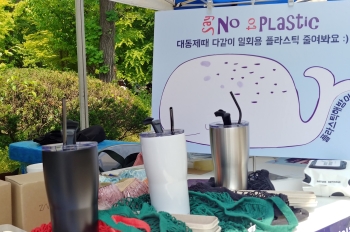
TongGam takes action to curb the use of plastic straws
In response to rising awareness of the need to cut the use of plastic, college students have started various campaigns and communities.
A launch event was held in Sinchon on May 9 for the “Straw Out Movement Kick-off Event,” a project to weed out the use of plastic straws. This was planned by non-profit organization TongGam, which was established in 2016 to tackle social issues in fun and engaging ways.
The event comprised different experience zones designed to promote people’s awareness on the environmental issue. One was called “From the Perspective of a Sea-turtle,” where participants wore a miniature turtle shell and traversed a stage decorated as a sea, passing through obstacles made from approximately 700 plastic straws.
At another booth, “Fortune Straw,” fortunes were told with eco-friendly straws. Attendees could also sign a pledge to avoid using disposable products. Participants were also given 1,000 won cafe discount coupons since about 20 cafes around Sinchon have signed contracts to provide customers with eco-friendly straws on the 11th day of every month. TongGam is seeking to encourage involvement in the plastic straw reduction movement by increasing the number of participating cafes to 100.
Gwak Jung-yun, vice-president of TongGam, explained why the organization has focused its campaigns on plastic straws, despite the existence of other products made out of plastic.
“People imprudently consume plastic straws and a myriad of disposable commodities, since they are not officially regulated according to the policy regarding recycling of resources,” Gwak said. “Furthermore, it is reported that Korea purchases the most plastic straws annually. Hence, we came up with this campaign to alert citizens to avoid the use of plastic and to introduce eco-friendly straws.”
Gwak also mentioned ways in which young people are using social media for the project to reach many college students.
“We use social media applications such as Facebook, Naver blogs, Instagram and Twitter to advertise the use of straws that are less detrimental to the environment,” Gwak said. “Through these projects, we hold online reward events and even provide participants with eco-friendly straws as gifts.”
Zero waste project “0 Tumbler”
Another student project to cut the use of plastic is “0 Tumbler,” which is co-hosted by the student club E-cube, Ewha Coop, and SK Telecom. Discounts are provided for using the shared reusable tumblers, which are available different campus areas at Ewha Coops in the Student Union Building, Hak-gwan, and Education Building. Following the success of the last semester, the 0 Tumbler project is planned to be held for 12 weeks this semester, helping students to protect the environment.
Students can take a 0 Tumbler from a showcase situated near Ewha Coop stores and request cafe staff to fill it with their ordered beverage. After finishing their drink, students return the 0 Tumbler to a designated return bin, separating the cup and the lid. This environmental campaign motivates students to opt for reusable tumblers instead of disposable cups on campus.
Daedong Festival booths: “No Plastic, So Fantastic”
Many booths during the Daedong Festival, held from May 14 to 16, advocated the usage of eco-friendly products instead of plastic.
Student club E-cube, which focuses on environmental protection, held a booth to promote 0 Tumbler as a way to reduce the use of disposable cups. E-cube aimed to increase use of 0 Tumblers by playing games with them. The club also advertised its official Instagram account to give students ready access to information about the project.
Han You-jung, the co-representative of E-cube, told how the club had decided to work on decreasing plastic use.
“By holding discussions and analyzing newspaper articles, we became aware of the problems caused by overusing plastic,” Han said. “Hence, our club members are currently sharing ideas considering how to decrease the use of plastic products in real life.”
Han also mentioned how E-cube members work to reduce plastic use in their daily lives and promote environmental protection to the public.
“We aimed to decrease the use of plastic at Daedong Festival booths by not using plastic straws and cups. When customers purchased beverages we gave them a 0 Tumbler with their drinks,” she said. “Moreover, a multi-use container rental service booth that rented spoon sets, tumblers, stainless steel straws and shopping baskets was run to reduce the use of plastic.”
This booth was situated near the Main Gate and the Student Union Building. With the theme “No Plastic, So Fantastic,” the enterprise was co-sponsored by E-cube and Climate and Environment Governance office of Seodaemun-gu. The office supported the booth by providing them with eco-friendly products to replace plastic.
“Due to the fact that plastic issues are critical these days, we cooperated with E-cube to make a meaningful service to the environment by supporting the booth,” Park Jun-shik, the director of Climate and Environment Governance office said. “It is our first time to join with Ewha at Daedong Festival and all the products like tumblers, stainless steel straws, and net bags were supplied by the Seoul Metropolitan Government.”
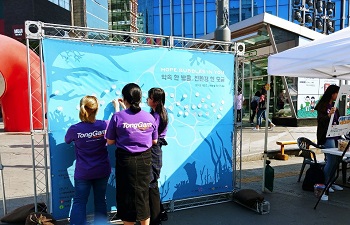
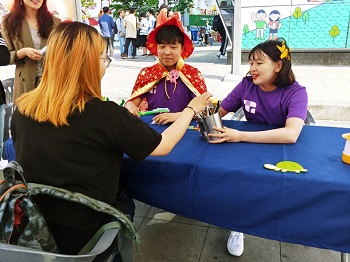
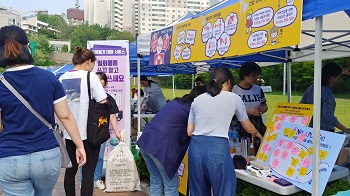
The Picker, Korea’s first plastic-free “grocerant”
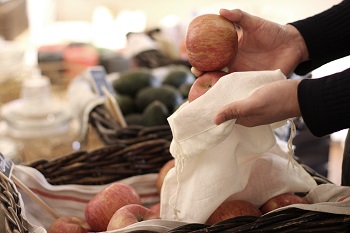
The Picker, founded in 2016, is a grocery store that also serves light meals. It is referred as a “grocerant,” a word coined from combining “groceries” and “restaurant.”
The store is also known as the first to put a zero-waste lifestyle into practice in Korea. It seeks to reduce trash by selling products in bulk and refraining from overpackaging. Instead of putting groceries in plastic bags, customers have to bring their own containers to carry their purchases, thereby practicing precycling.
“The store all started from personal discomfort,” said Song Kyung-ho, co-CEO of The Picker. “It was inconvenient that I had to unwrap and throw away all of the packaging from items that I purchased. I also felt uncomfortable that the trash I threw away caused environmental harm. Thus, it was a matter of dealing with social problems as well as personal discomfort.”
Song mentioned that he and his co-CEO, Hong Ji-sun, were initially interested in upcycling and recycling. However, they started questioning why plastic waste continually increased even with the implementation of many quality approaches such as upcycling and recycling. Thus, they decided to focus on how to reduce trash and plastic in the first place, instead of on how to reuse it once it had been created.
Hong explained that running a store without plastic does not bring economic benefits.
“The problem with plastic is that it is cheap, easy to manufacture and convenient to use, so it is in a perfect state to easily produce, consume and throw away,” Hong said. “The cost of packaging does not take up a big part of products and we cannot save a lot of money by not using plastic.”
Hong further stated that The Picker is rather less competitive in means of reducing costs because of the uncommon style of its sales. However, they are overcoming such difficulties by directly requesting production from their suppliers. With such efforts, most products at the store are sold at the average market price.
Song mentioned some difficulties they encountered in the beginning.
“At first, it was not easy to make a profit due to the store’s unusual way of selling and its appearance. Also, there was no precedent to refer to, which made it difficult for us to receive any useful consultation. But most of all, it was especially difficult to find farms that could provide us with a small amount of unpackaged organic food.”
Song commented that they now can handle such problems better due to the data they have from running the store. He also explained that they tried hard to promote the store based on its green values. Adding a restaurant element to their business was part of this promotion.
“As we lacked customers in the beginning, running a restaurant alongside the grocery store was a way to avoid food waste as well as providing vegetarian meals to customers,” Song said.
Hong stated that their customers are not confined to a certain age group, but range from little children to the elderly. However, she mentioned that with the rising awareness on waste, the proportion of women in their 30s among new customers has dramatically increased.
Hong and Song shared what their vision for consumerism in the future.
“We like pictures of Chosun Dynasty and Namdaemun Market in the 70s the most,” Hong said. “Back then, there was a healthy consumer culture as well as no waste problem even without the phrase zero waste. We hope everyone pursues a zero-waste lifestyle, so that these are no longer special words.”
